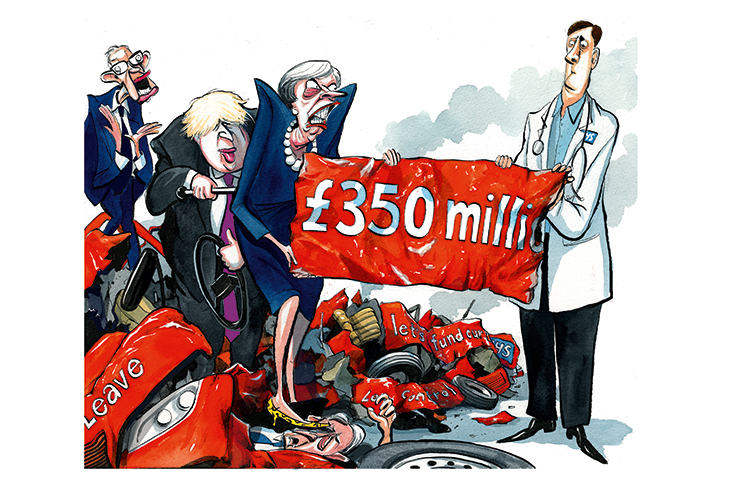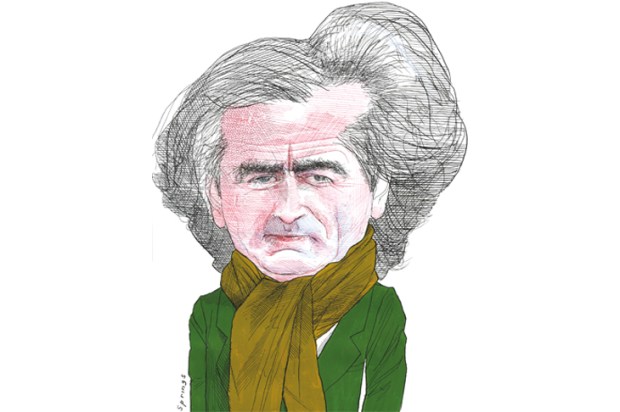A fortnight before Philip Hammond delivered his last Budget, the chief executive of the NHS gave a speech making the case for more funding. Simon Stevens had brought with him picture of a Vote Leave poster, promising £350 million a week for the health service, which he showed to his audience. What a good idea, he said. He wasn’t coming out as a Brexiteer, but he did think the Leavers had a point about giving an extra £350 million a week to the National Health Service. In fact, he went so far as to say that the ‘public want to see’ this promise honoured.
And if politicians don’t cough up? ‘Trust in democratic politics will not be strengthened,’ he said, ‘if anyone now tries to argue, “You voted Brexit, partly for a better funded health service. But precisely because of Brexit, you now can’t have one.”’
The Chancellor and the Treasury were incandescent about Stevens’s intervention. He’s supposed to be a bureaucrat, a chief operating officer, and ought not to be on manoeuvres, they thought. To demand money so close to a budget was to play politics — but worse, it was to play politics well. Hammond was infuriated by the reference to Vote Leave’s £350 million a week, but perhaps even more so by the sense that he was being outplayed.
Stevens is about to get what he demanded. Theresa May plans to give the NHS a present, ahead of its 70th birthday in July — a settlement of 3 per cent extra a year, which would mean that by the next election NHS spending would be £350 million a week more than it is today. This means, much to Hammond’s rage, that the famous Brexit bus pledge is to be honoured — though not of course with money saved by leaving the EU.
Stevens, ever wily, now wants the figure to be closer to 4 per cent, and for the next decade. Hammond, a political realist, has accepted the case for giving significantly more money to the NHS. But the Treasury prefers an increase of around 3 per cent and for five years, not ten. Nor has Hammond agreed that this sum ought to be dressed up as an NHS birthday present.
This debate over NHS funding is a proxy for the battle over the soul of the Tory party. At stake are three big questions: should the Tories be the Brexit party? Are they the party of fiscal discipline? And what is the best way to defeat Jeremy Corbyn?
Vote Leave’s pledge to ‘stop sending £350 million a week to Brussels and spend it on our priorities like the NHS’ was one of the keys to its victory. Focus on the NHS gave Eurosceptic arguments about sovereignty a resonance that they had never had before. Tory MP Brexiteers were taken aback by how electorally potent this was: it left them with a changed view of the politics of the NHS. For the first time, they were inducted into the mysteries of the national religion.
But those Tories who were on the Remain side of the debate, including the Chancellor, feel very differently about it. They view the pledge as irresponsible and misleading and are extremely unhappy that the Brexiteer ministers who made it might be seen to be honouring it.
Remainer Tories like Hammond like to point out that any extra money for our health service isn’t coming from the UK’s budget contribution to the EU. When it was put to one cabinet minister (a Remain voter) that the Tories should dress up the extra money for the NHS as a down payment on £350 million a week, the answer came back that this would make Boris Johnson ‘insufferable’. Another asked: ‘Why do we have to give in to Simon Stevens? Can’t we tell him to push off?’
This attitude speaks of a failure to even try to understand the electorate. Voters don’t see a divided cabinet, they see a referendum called by a Tory prime minister, a Leave campaign dominated by Tory politicians and, most importantly, Brexit being implemented by a Tory government. If leaving the EU fails to live up to their expectations, then they’ll blame the Tories.
For this reason, the government would be wise to present the extra money for the NHS as an advance on the £350 million pledge, but the cabinet’s internal politics pretty much guarantees that they won’t do that. One of those intimately involved in these negotiations says, ‘There’s a sense, frankly, that Hammond is determined not to reward the promises that were made by the Brexit campaign. The phrase “punishment budget” springs to mind. He doesn’t want “to give Boris, Jacob and various others the chance to say: look, we delivered”.’
Hammond is right to think that a big spending increase for the NHS would certainly make it easier for a Brexiteer to succeed Theresa May as PM.
The next question is just as existential: should the Tories be fiscal conservatives? When David Cameron and George Osborne walked into Downing Street, bringing down the deficit was the Tories’ principal objective. In their 2015 manifesto, the Tories committed to balancing the books by 2020 — declaring that this was ‘the only way to keep our economy secure’. It was, in reality, just a means of deepening the divide between their party and Labour. Osborne spoke about austerity but he took the national debt from £1 trillion to £1.7 trillion. Indeed, the size of government is on its way to a 30-year high.
Today’s Tories no longer bother to pretend to admire austerity. In the last election, the party didn’t even promise to eliminate the deficit in this parliament. Embracing a multi-year, inflation-busting increase for the NHS without cutting elsewhere or raising taxes proves this step change. The three-year spending review is due in November, but the NHS rise will mean that the biggest decisions have already been made. The only other decisions will be how tightly to squeeze defence, policing and prisons — or whether to just let the debt rise.
To balance the books with a tax rise would blunt another Tory assault on Labour: they’ll cost you more. This could be a particularly valuable weapon. Polling shown to the political cabinet this week reveals that when voters are asked what is the biggest issue for them personally, the most popular reply is cost of living.
On top of this, the whips are pessimistic about getting a tax rise through this hung parliament. A backbench rebellion crushed Hammond’s attempt to increase National Insurance on the self-employed, with humiliating results. A tax hike is just as unpopular now: even those who are not opposed to a tax rise per se fear that using NI to finance a health splurge would exacerbate generational inequality, as it is paid by the working–age population, and around 70 per cent of NHS health spending goes on the pension-aged.
The alternative, of cuts elsewhere, is equally politically unpalatable. The low-hanging fruits of deficit reduction were picked long ago. It is hard to see where else in the government budget it would be politically possible to find the kind of money required to pay for a sustained programme of big NHS spending increases. There is pressure in nearly every area now for more spending, and many Tory MPs are agitating for more money for education.
So what about simply letting growth take the strain? After all, in the spring statement Hammond sounded very confident that the economy would outperform the Office for Budget Responsibility’s forecasts. Taking such a punt would be a big risk, especially after the anaemic growth figures for the first quarter of this year.
It is hard to see the Chancellor signing off on this approach. ‘He’s a fiscal conservative, ultimately,’ points out one long-time cabinet colleague. These doubts mean that there is uncertainty about whether the NHS’s big birthday present will arrive on time.
This is why the Treasury has been so concerned about the NHS splurge — but politics have triumphed over the economics. The Brexiteers want the bus pledge, Boris Johnson was noisily banging the drum for it back in January, and No. 10 knows that the Tories can’t fight the next election with the NHS as a ‘gaping wound’. Jeremy Corbyn would like nothing more than to be able to turn the next general election into a referendum on the state of the NHS.
Ultimately, most Tories will accept that extra borrowing is a price worth paying to avoid that. They know from the 2015 campaign that the political potency of a long-term NHS funding settlement comes from being able to say that the health service’s own management think they have enough money. And Stevens is unlikely to endorse a limited settlement. He takes the view that a 3 per cent increase would still be a quarter less than what most governments have put into the NHS since its creation and will be far from transformative.
There is also a respectable case for more money in policy terms. A commitment to a long-term plan would be superior to a series of emergency cash injections. It would allow you to get more for the same amount of money. Currently, the budget crunch is defeating attempts to transform the health service. As one senior figure in the Ministry of Health and Social Care points out, hospital trusts regularly end up using the money that is meant to update their services to pay for day-to-day spending, as that is the only way they think they can get through the winter.
When Tony Blair promised more money for the NHS, he demanded big structural reforms as the price for that. But the Tories see the extra money — the £350 million a week and more — almost as an aim in itself. Since when did Conservatives judge public services by how much they cost?
But there are not many Tories minded to make this point now: exhausted by years of slow-motion austerity, they wish to turn the page. And if that means bigger government, so be it.
Got something to add? Join the discussion and comment below.
Get 10 issues for just $10
Subscribe to The Spectator Australia today for the next 10 magazine issues, plus full online access, for just $10.
You might disagree with half of it, but you’ll enjoy reading all of it. Try your first month for free, then just $2 a week for the remainder of your first year.














Comments
Don't miss out
Join the conversation with other Spectator Australia readers. Subscribe to leave a comment.
SUBSCRIBEAlready a subscriber? Log in